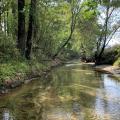Nuisance Species
Nuisance Species
Turtles
Turtles usually are not a biological problem in farm ponds, but they might sometimes compete with fish for food items such as crawfish, insects, or other small food items. They can, though, create a nuisance to anglers when they are caught on hooks and must be removed, when they take baits intended for fish on trot lines, or when they eat fish on stringers left in the water. Turtles also become a problem in ponds where fish are being fed, because turtles quickly learn that fish food tastes good and represents an easy and free meal.
However, turtles can be beneficial. Their greatest service is as scavengers to eat dead fish and other animals or to eliminate diseased or weakened fish. Except for snapping varieties, turtles do not capture many live fish and should not be considered a problem in this regard.
Before pursuing any type of control method, consider whether or not turtles are a genuine problem in your pond. Unless numbers are high and the interference with other pond uses is severe, it is probably best to leave the turtles alone. However, if you have significant problems, you may need to consider removing some turtles.
Shooting turtles as they bask in the sun or as they swim in the water is an old practice you should never use. Shooting into or across water is dangerous! Shooting also creates the possibility of killing a protected species, since identification from a distance is impossible. You can’t use repellents or toxicants, so trapping is the only choice.
Trapping can effectively reduce local populations. The best seasons for trapping are spring, summer, and early fall. Most turtles are inactive through the winter and feed very little, which makes baited traps ineffective during that time.
Although you can trap snappers and soft-shelled turtles using underwater baited traps, you usually don’t have to remove these species from a farm pond. The more aggravating species are the “baskers,” which often crowd together in large numbers on stumps, logs, or other structures above the water surface. By taking advantage of this, you can trap these species with a trap-box in the area turtles normally use. This trap has boards leading up from the water, with pivoting “balance boards.” When the turtles crawl onto these platforms, they weigh down the boards, dropping the turtles into the collection box.
Check traps daily and remove all turtles, then take the turtles to another location at least several miles away and release them into their natural habitat. However, understand that your release site is important, as you want the turtles to survive and you do not want to create a problem for someone else. Be careful not to violate state laws when transporting turtles, and do not carry them across state lines, since other states have different laws.
If you do not plan to visit the trap for a long while, flip it over on its side so turtles are not captured and left in the trap.
Other Problem Animals
Many animal species can take up residence on small lakes and ponds. Beavers, muskrats, nutria, alligators, and geese can be a nuisance or even cause damage.
Burrowing and damming activities can cause dam failure or flood adjacent landowners. Tree cutting and flooding can cause loss of valuable timber. Beaver dens or huts may be great places to fish, but it is at the landowner’s expense. Fish attractors can give the same success with no sacrifices.
Otters can quietly steal your fish at night. A family of otters, although cute, can virtually eliminate catchable-size fish in a small pond. The best control is immediate action at the first sign of these animals living in your lake. For species such as nutria, beavers, and muskrat, trapping is the most effective control. There are professional trappers that can assist. If an alligator is residing in your lake, contact your state management agency as this species is protected.
Publications
News
Whether you have a large lawn, field, or pasture, you’ve probably had to deal with pesky weeds.
BILOXI, Miss. -- The Southeast has some of the most commercially and recreationally valuable fisheries in the United States.
STARKVILLE, Miss. -- The presence of a water source on private land can make a property much more desirable for several reasons.
Success Stories
Billy Mitchell spent his childhood summers in the water and has lived at Pelahatchie Bay for more than three decades, so his dedication to protecting water resources now almost makes too much sense.






